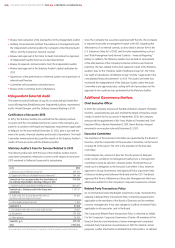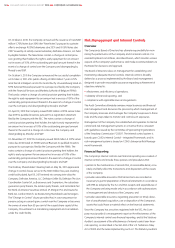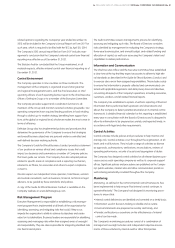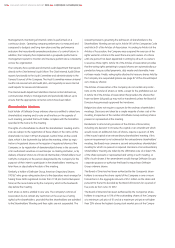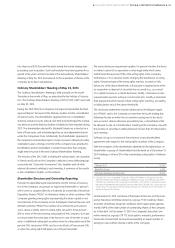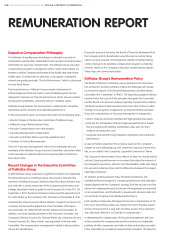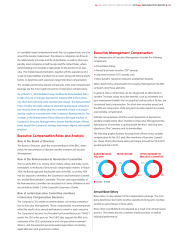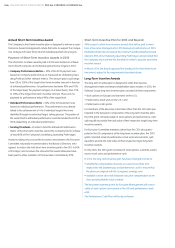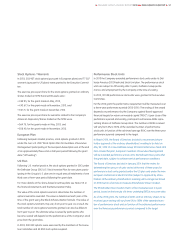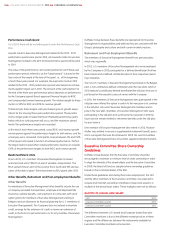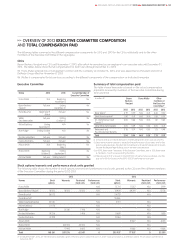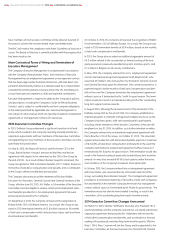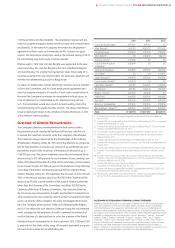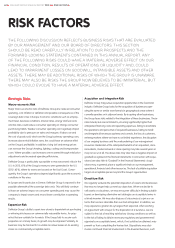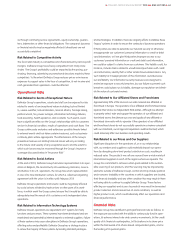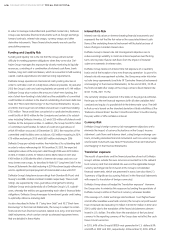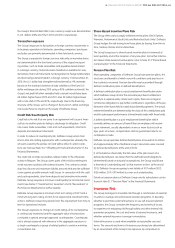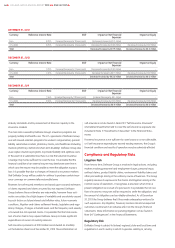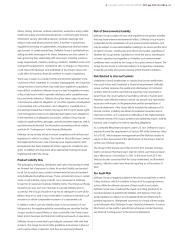Food Lion 2013 Annual Report Download - page 60
Download and view the complete annual report
Please find page 60 of the 2013 Food Lion annual report below. You can navigate through the pages in the report by either clicking on the pages listed below, or by using the keyword search tool below to find specific information within the annual report.
Performance Cash Grant
As of 2014, there will be no further grants under the Performance Cash
Plan.
Awards made to Executive Management related to the 2010 - 2012
performance period were paid in 2013, and awards made to Executive
Management related to the 2011-2013 performance period will be paid
in 2014.
The value of the performance cash award granted for each three year
performance period, referred to as the “target award,” is based on the
face value of the award at the time of the grant, i.e., at the beginning
of each three-year period. For example, the payments made in 2013
related to the 2010 - 2012 performance period were based on achieve-
ments against targets set in 2010. The amount of the cash payment at
the end of the three-year performance period depends on performance
by the Company against Board-approved financial targets for ROIC
and compounded annual revenue growth. The relative weight for these
metrics is 50% for ROIC and 50% for revenue growth.
The Board sets these targets each year based upon its growth expec-
tations for the ensuing three-year performance period. These perfor-
mance target goals included minimum threshold performance goals
below which no cash payment will occur, and the maximum award
levels if the performance targets are exceeded.
At the end of each three-year period, actual ROIC and revenue growth
are measured against the performance targets for both metrics and the
actual pay-out is calculated. Participants receive between 0% and 150%
of the target cash award in function of achieved performance. 150% of
the target award is paid when actual performance reaches or exceeds
120% of the performance targets for both ROIC and revenue growth.
Restricted Stock Units
Prior to 2013, U.S. members of Executive Management received
restricted stock units (“RSUs”) as part of variable compensation. The
RSUs vested 25% on each of the second, third, fourth and fifth anniver-
saries of the date of grant. There have been no RSU grants after 2012.
Other Benefits, Retirement and Post-employment Benefits
Other Benefits
For members of Executive Management other benefits include the use
of company-provided transportation, employee and dependent life
insurance, welfare benefits, cash payments in connection with stock
option grants (for members of Executive Management residing in
Belgium) and an allowance for financial planning (for U.S. members of
Executive Management). The Company does not extend or maintain
credit, arrange for the extension of credit, or renew an extension of
credit, in the form of a personal loan to or for any member of Executive
Management.
Delhaize Group believes these benefits are appropriate for Executive
Management’s responsibilities and believes they are consistent with the
Group’s philosophy and culture and with current market practices.
Retirement and Post-Employment Benefits
The members of Executive Management benefit from pension plans,
which vary regionally.
In 2013, U.S. members of Executive Management who were employed
by the Company in 2012 participated in a defined benefit plan (that has
been frozen) and a defined contribution plan in their respective operat-
ing companies.
The non-U.S. members of Executive Management participate in the Belgian
plan, a non-contributory defined contribution plan (the new plan), which in
2010 replaced a contributory defined benefit plan (the old plan), that was in
part based on the executive’s years of service with the Company.
In 2010, the members of Executive Management who participated in the
old plan were offered the option to switch to the new plan or to continue
in the old plan. All current Executive Management members partici-
pate in the new plan. Members of Executive Management who were
participating in the old plan and switched to the new plan in 2010 for
future service remain entitled to retirement benefits under the old plan
for past service.
One member of Executive Management who retired in 2013, Michael
Waller, was entitled to receive a supplemental retirement benefit, pursu-
ant to a program that was discontinued in 2009. No current members
of Executive Management have any similar supplemental plan benefits.
Executive Committee Share Ownership
Guidelines
Delhaize Group believes that the Executive Committee should be
encouraged to maintain a minimum level of share ownership in order
to align the interests of the shareholders and the Executive Committee.
In 2008, the Board of Directors adopted share ownership guidelines
based on the recommendation of the RNC.
Under these guidelines and during their active employment, the CEO
and the other members of the Executive Committee are expected to
acquire and maintain ownership of Delhaize Group stock equal to a
multiple of the annual base salary. These multiples were set as follows:
MULTIPLE OF ANNUAL BASE SALARY
CEO 300%
Executive Committee $ payroll 200%
Executive Committee € payroll 100%
The difference between U.S.-based and European-based Executive
Committee members is due to the different market practices in these
regions and the differences between the instruments available for
Executive Committee members remuneration.
58
DELHAIZE GROUP ANNUAL REPORT 2013
CORPORATE GOVERNANCE


